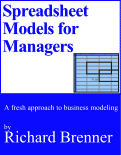

Spreadsheet Models for Managers
Getting Access to Spreadsheet Models for Managers
If  you use Excel to model businesses, business processes, or
business transactions, this course will change your life. You’ll learn how to create tools for yourself that will amaze
even you. Unrestricted use of this material is available in two ways.
you use Excel to model businesses, business processes, or
business transactions, this course will change your life. You’ll learn how to create tools for yourself that will amaze
even you. Unrestricted use of this material is available in two ways.
- As a stand-alone Web site
- It resides on your computer, and you can use it anywhere. No need for Internet access.
- At this Web site
- If you have access to the Internet whenever you want to view this material, you can purchase on-line access. Unlimited usage. I’m constantly making improvements and you’ll get them as soon as they’re available.
To Order On Line
| Order "Spreadsheet Models for Managers, on-line edition, one month" by credit card, for USD 69.95 each, using our secure server, and receive download instructions by return email. |
| Order "Spreadsheet Models for Managers, on-line edition, three months" by credit card, for USD 199.00 each, using our secure server, and receive download instructions by return email. |
| Order "Spreadsheet Models for Managers, downloadable hyperbook edition" by credit card, for USD 199.00 each, using our secure server, and receive download instructions by return email. |
To Order by Mail
Make your check payable to Chaco Canyon Consulting, for the amount indicated:
|
And send it to: Chaco Canyon Consulting 700 Huron Avenue, Suite 19C Cambridge, MA 02138 |
To use the course software you’ll need some other applications, which you very probably already have. By placing your order, you’re confirming that you have the software you need, as described on this site.

Spreadsheet Models for Managers
| Terminology | 13/7 Session Links |
You probably won’t find this terminology in common use in the Excel community, but we find it helpful for thinking about function macros.
Function macros that return arrays of values usually require some form of iteration. This is especially true if their arguments are arrays, because the inner workings of the macro have to somehow access the different cells in the arguments.
Iteration is a procedural technique that enables the macro to repeat a set of operations for each cell in a range. The term iteration means (roughly) repetition. See the dictionary definition.
Of course, it’s possible that iteration won’t be involved even if the macro is an array macro, or that it might be involved when the macro is a scalar macro. It depends on the situation. We’ll explore this in the next session.
Last Modified: Sunday, 03-Aug-2025 03:54:37 EDT
We focus on function macros in this course because they’re more likely than command macros to make a real difference in your facility with constructing models. For instance, when your customer wants to see result streams displayed as [Month1, Month2, Month3, Q1 Total, Month4, Month5, Month6, Q2 Total, …], you probably realize that such a layout makes copy/paste and fill very inconvenient. A macro can provide a simple means of producing the preferred layout from a more easily maintained pure month structure. It’s also easy to construct macros for running sums and running differences. Can you think of other applications for function macros that make your models easier to build and maintain?



